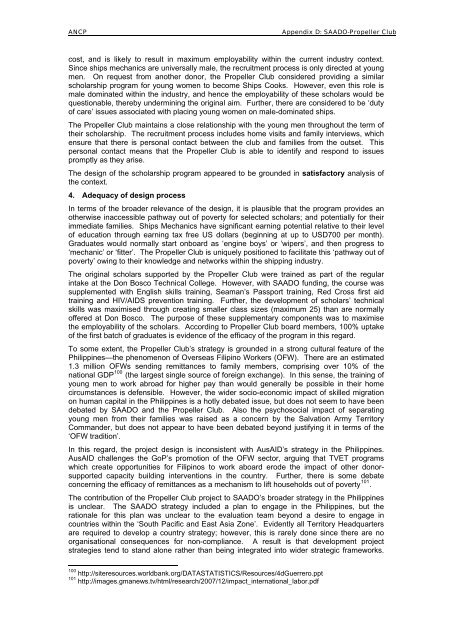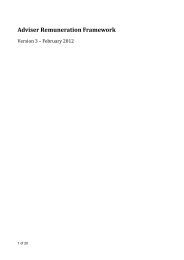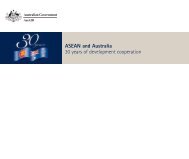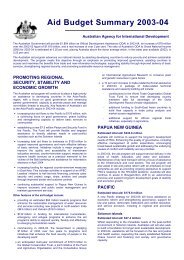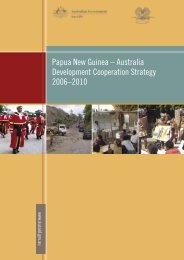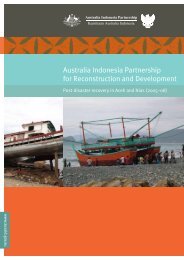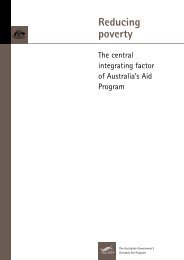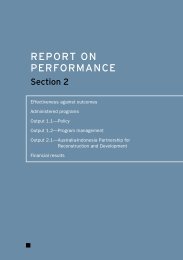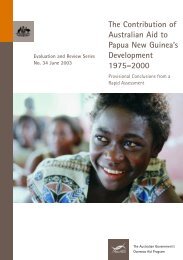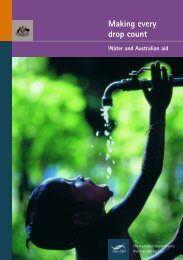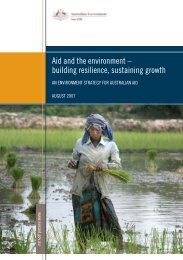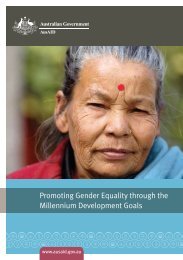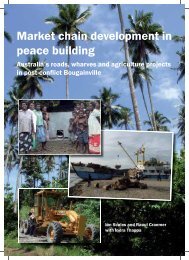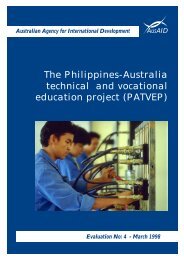ANCP Philippines Cluster Evaluation Report - AusAID
ANCP Philippines Cluster Evaluation Report - AusAID
ANCP Philippines Cluster Evaluation Report - AusAID
Create successful ePaper yourself
Turn your PDF publications into a flip-book with our unique Google optimized e-Paper software.
<strong>ANCP</strong>Appendix D: SAADO-Propeller Clubcost, and is likely to result in maximum employability within the current industry context.Since ships mechanics are universally male, the recruitment process is only directed at youngmen. On request from another donor, the Propeller Club considered providing a similarscholarship program for young women to become Ships Cooks. However, even this role ismale dominated within the industry, and hence the employability of these scholars would bequestionable, thereby undermining the original aim. Further, there are considered to be ‘dutyof care’ issues associated with placing young women on male-dominated ships.The Propeller Club maintains a close relationship with the young men throughout the term oftheir scholarship. The recruitment process includes home visits and family interviews, whichensure that there is personal contact between the club and families from the outset. Thispersonal contact means that the Propeller Club is able to identify and respond to issuespromptly as they arise.The design of the scholarship program appeared to be grounded in satisfactory analysis ofthe context.4. Adequacy of design processIn terms of the broader relevance of the design, it is plausible that the program provides anotherwise inaccessible pathway out of poverty for selected scholars; and potentially for theirimmediate families. Ships Mechanics have significant earning potential relative to their levelof education through earning tax free US dollars (beginning at up to USD700 per month).Graduates would normally start onboard as ‘engine boys’ or ‘wipers’, and then progress to‘mechanic’ or ‘fitter’. The Propeller Club is uniquely positioned to facilitate this ‘pathway out ofpoverty’ owing to their knowledge and networks within the shipping industry.The original scholars supported by the Propeller Club were trained as part of the regularintake at the Don Bosco Technical College. However, with SAADO funding, the course wassupplemented with English skills training, Seaman’s Passport training, Red Cross first aidtraining and HIV/AIDS prevention training. Further, the development of scholars’ technicalskills was maximised through creating smaller class sizes (maximum 25) than are normallyoffered at Don Bosco. The purpose of these supplementary components was to maximisethe employability of the scholars. According to Propeller Club board members, 100% uptakeof the first batch of graduates is evidence of the efficacy of the program in this regard.To some extent, the Propeller Club’s strategy is grounded in a strong cultural feature of the<strong>Philippines</strong>—the phenomenon of Overseas Filipino Workers (OFW). There are an estimated1.3 million OFWs sending remittances to family members, comprising over 10% of thenational GDP 100 (the largest single source of foreign exchange). In this sense, the training ofyoung men to work abroad for higher pay than would generally be possible in their homecircumstances is defensible. However, the wider socio-economic impact of skilled migrationon human capital in the <strong>Philippines</strong> is a hotly debated issue, but does not seem to have beendebated by SAADO and the Propeller Club. Also the psychosocial impact of separatingyoung men from their families was raised as a concern by the Salvation Army TerritoryCommander, but does not appear to have been debated beyond justifying it in terms of the‘OFW tradition’.In this regard, the project design is inconsistent with <strong>AusAID</strong>’s strategy in the <strong>Philippines</strong>.<strong>AusAID</strong> challenges the GoP’s promotion of the OFW sector, arguing that TVET programswhich create opportunities for Filipinos to work aboard erode the impact of other donorsupportedcapacity building interventions in the country. Further, there is some debateconcerning the efficacy of remittances as a mechanism to lift households out of poverty 101 .The contribution of the Propeller Club project to SAADO’s broader strategy in the <strong>Philippines</strong>is unclear. The SAADO strategy included a plan to engage in the <strong>Philippines</strong>, but therationale for this plan was unclear to the evaluation team beyond a desire to engage incountries within the ‘South Pacific and East Asia Zone’. Evidently all Territory Headquartersare required to develop a country strategy; however, this is rarely done since there are noorganisational consequences for non-compliance. A result is that development projectstrategies tend to stand alone rather than being integrated into wider strategic frameworks.100 http://siteresources.worldbank.org/DATASTATISTICS/Resources/4dGuerrero.ppt101 http://images.gmanews.tv/html/research/2007/12/impact_international_labor.pdf<strong>ANCP</strong> <strong>Philippines</strong> <strong>Cluster</strong> <strong>Evaluation</strong> <strong>Report</strong> (ver. 2.0)XLII


